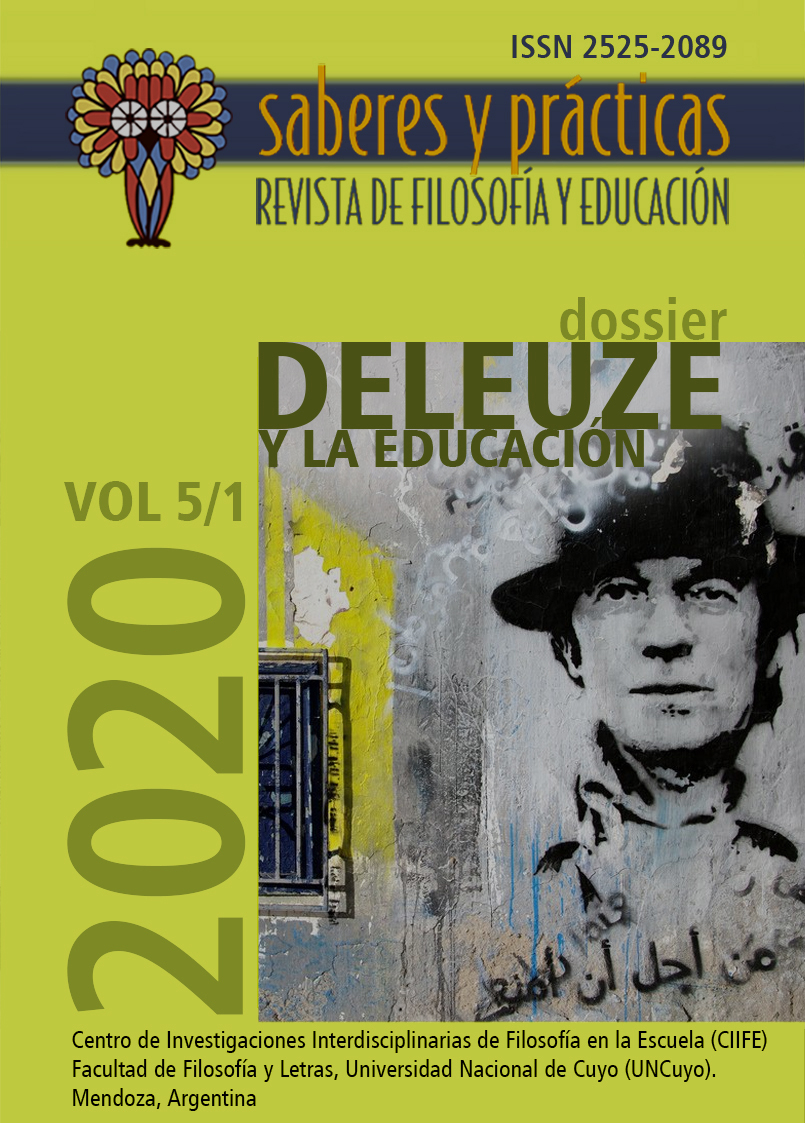Become-children and the confaulatory game
Keywords:
becoming child, game, event, fabulation, educationAbstract
The present work exposes seven sections that can be organized in three segments. The first one analyzes how the child's presence is monitored and codified in the control society. The second focuses on the contributions made by Guattari and Deleuze, together, about the relationship of the child, psychoanalysis and capitalism. There it is argued that a new educational experience is only possible from the reflection of an ontology of the minority, since only on this plane does temporality unfold as blocks of becoming. It is also considered that the infant's oedipal encodings can be overcome from his experimentation with the game. Only in this way does the child's desire immediately turn to the social field. While in the third and last segment the contributions of the philosopher Deleuze are reviewed, in his first books. The relationship between becoming and the educational event is analyzed. An attempt is made to think of the ideal game as a form of collusion. Nietzsche's critique of nihilism is also analyzed as a necessary step to understand the relationship between innocence and the child's existence. Such understanding is necessary for the implementation of that conspiracy of the educational event.
Downloads
References
Aristóteles. (2000). Metafísica. Sudamérica.
Benjamin, W. (1989). Tesis de filosofía de la historia, en Discursos interrumpidos. Taurus.
Bettleheim, B. (1987). La fortaleza vacía. El autismo infantil y el nacimiento del sí mismo. Laia.
Bourdieu, P. y Passeron, J.C. (2017). La Reproducción: elementos para una teoría del sistema educativo. Siglo XXI.
Carroll, L. (2003). Alicia En El País De Las Maravillas. Ediciones del Sur.
Carroll, L. (1981). Alicia a través del espejo. Alianza.
Carroll, L. The Dynamics of a Parti-cle (1874) "Plain Superficiality is the character of a speech" (Cap. I. def. I). https://en.wikisource.org/wiki/The_Dynamics_of_a_Parti-cle
Deleuze, G. (1987). Cine 2. La imagen-tiempo. Paidós.
Deleuze, G. (1987). Dos regímenes locos.Pre-Textos.
Deleuze, G. (1988). Diferencia y Repetición. Júcar.
Deleuze, G. (1994). Lógica del sentido. Paidós.
Deleuze, G. (1995). Proust y los signos. Anagrama.
Deleuze, G. (2002a). Nietzsche y la filosofía. Nacional.
Deleuze, G. (2005b). La isla desierta y otros textos. Pre-textos.
Deleuze, G. (2002c). Conversaciones. Nacional.
Deleuze, G. y Guattari, F. (2002b). Kafka, por una literatura menor. Nacional.
Deleuze, G. y Guattari, F. (2004). Mil Mesetas: capitalismo y esquizofrenia. Paidós.
Deleuze, G. y Guattari, F. (2005a). El Anti Edipo: capitalismo y esquizofrenia. Paidós.
Freud, S. (1992). "Pegan a un niño".Obras Completas Tomo XVII. Amorrortu.
Gallo, S. (2010). Filosofía, enseñanza y sociedad de control. Cuestiones de Filosofía, 12: 1-20.
Kafka, F. (1999). Obras completas: Novelas: El desaparecido; El proceso; El castillo. Círculo de lectores.
Kafka, F. (2006). El proceso. Colihue.
Mondolfo, R. (1983). Heráclito: textos y problemas de su interpretación. Siglo XXI.
Nietzsche, F. (1998). El nacimiento de la tragedia. Alianza.
Nietzsche, F. (2000).Voluntad de poder. Edaf.
Nietzsche, F. (2003a). Así Habló Zaratustra. Alianza.
Nietzsche, F. (2003b). Filosofía en la época trágica de los griegos. Valdemar.
Platón. (1988). Diálogos IV, República. Gredos.
Shakespeare, W. (2005). Hamlet (Ed. bilingüe ingles/castellano). Cátedra.
Vanegas, B. E. (2017). "La infancia como sujeto de derechos. Un análisis crítico". Revista Ratio Juris 12.24: 127-142.
Published
How to Cite
Issue
Section
License

This work is licensed under a Creative Commons Attribution-NonCommercial-ShareAlike 2.5 Argentina License.









